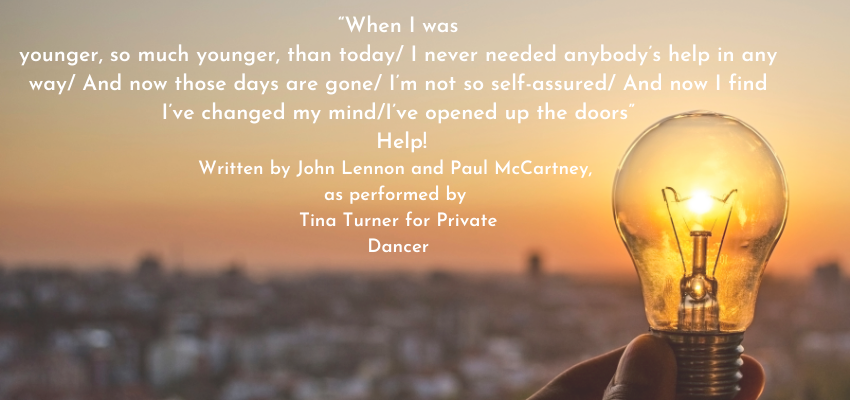
“When I was younger, so much younger, than today/ I never needed anybody’s help in any way/ And now those days are gone/ I’m not so self-assured/ And now I find I’ve changed my mind/I’ve opened up the doors”
— Help! (Written by John Lennon and Paul McCartney, as performed by Tina Turner for Private Dancer)
John Lennon and Paul McCartney wrote Help! for The Beatles’ 1965 film of the same name. The Beatles later admitted that both the song and its namesake film were created while the band was dazed and heedless under the effects of marijuana. Lennon, in particular, revealed that, lyrically, he wrote the song “crying out for help” because he felt insecure, overweight and lost. In a moment of deep candor, he further revealed that fame, in essence, had begun to feel unrelenting and that The Beatles’ level of fame was personally confounding. Even still, given its original up-tempo movement, exclamatory title, and sunny disposition, the song’s popularity, conversely, was based on its outward joviality. People loved it because it danced, was danceable, and because it felt good. If summer warmth and nonchalance were a song, Help! as it was originally written was their expression. By the time Tina Turner recorded the song on 1984’s Private Dancer, The Beatles had disbanded and Lennon had been assassinated. Tina’s Help was plaintive instead of exclamatory, was paced at a slower tempo, and her singing was far more gospel than rock and roll; it imbued the lyrics with elements of their original meaning: despair, loss, confusion and the blues. Nineteen years later, Help! had returned to its purposeful center: help me.
More often than we notice, our friends give the impression of feeling at ease as they deftly stifle concerns, stress, desperation and helplessness. Help is not just for the sunken or defeated, it is also for the clinically happy, the outwardly satisfied, the extravagantly successful, the moderately accomplished, and yes, even for that person who is apparently doing just fine. Help is for everyone.
During my senior year of high school, I worked for a video chain suitably named Movie Gallery. These were the days of VHS tapes. I spent hours rewinding analog cassettes, splicing out playback interruptions, and watching new releases so that I could answer questions in earnest regarding a movie’s appeal or propriety for certain age groups or audiences. It was a dream job for a nerdy high schooler in a small town because I became the inside man for coveted new releases. If you really wanted to see a movie, and always seemed to miss the last available copy, I could put one aside for you as soon as it was returned. It was not the power rather the fleeting popularity, the quick sensations of being liked. They were addictive for an awkward teen with multiple hidden insecurities. My insecurities were so extensive that even being voted as president of my senior class felt like a miscount. I quietly waited for days to be pulled aside and informed that they had called the wrong name or that the votes had been mis-tallied in my favor. The correction I expected never came. I eventually supposed I had won outright, and not by error.
Where coursework was concerned, I was studious and capable. Interpersonally, I was a disaster! I was easily the thinnest and shortest of my four siblings –relative to our ages– and I was not particularly athletic in a town predominated by a real fervor for high school football, SEC football, professional football, flag football, recreational football, thoughts and dreams of football, and then of course basketball at all possible levels! This meant that even when I was physically present in conversations, I in effect stood outside of them. For the better part of six years I felt invisible, and I grew to resent my hometown. My cry for help was being as loud as possible. I spoke and laughed at decibels that could be perceived around the corner and down the street. I used volume to improve my size and standing, and it was met with mixed responses. On the one hand, I graduated as the “Loudest Male Student,” a category created especially for me. On the other, I drew irritated glances and hushed chatter. I took it all personally. I declared myself a misfit and vowed to move away forever. I was loud but could not be heard. I was awkward but could not be seen. I was miserable, but wore expressions that indicated joy, comfort, excitement, connectedness, and affection. Only the affection was real.
I graduated high school and began my countdown to college. I told absolutely no one except my oldest brother that I would only ever return home for visits. When I packed the family car for the long drive from Alabama to Illinois, I packed everything I owned. I rode fifteen hours (with stops) folded around an ironing board, resting against suitcases, and squeezed into the tiniest sliver of backseat I could sit on without leaning against the door. I found myself at this extreme because I had not developed the courage to tell my parents, “I feel like an outsider in this town, and that makes me unhappy.” When we arrived at Lake Forest, my parents helped me move into my dormitory. I unfurled a life-size cardboard replica of Tina Turner, a promotion for the movie about her life. It was given to me by my supervisor as a graduation gift. I put Tina next to the window and drifted into a deep sleep, believing that I had found the help I needed nearly 1,000 miles away from home.
Many years would pass, multiple heartbreaks would occur, two deep depressions would be suffered, and one brilliant but unexpected mid-life career shift would eventuate before I realized that I did not need to live 1,000 miles away from home “forever” in order to find help. I simply needed to ask.

